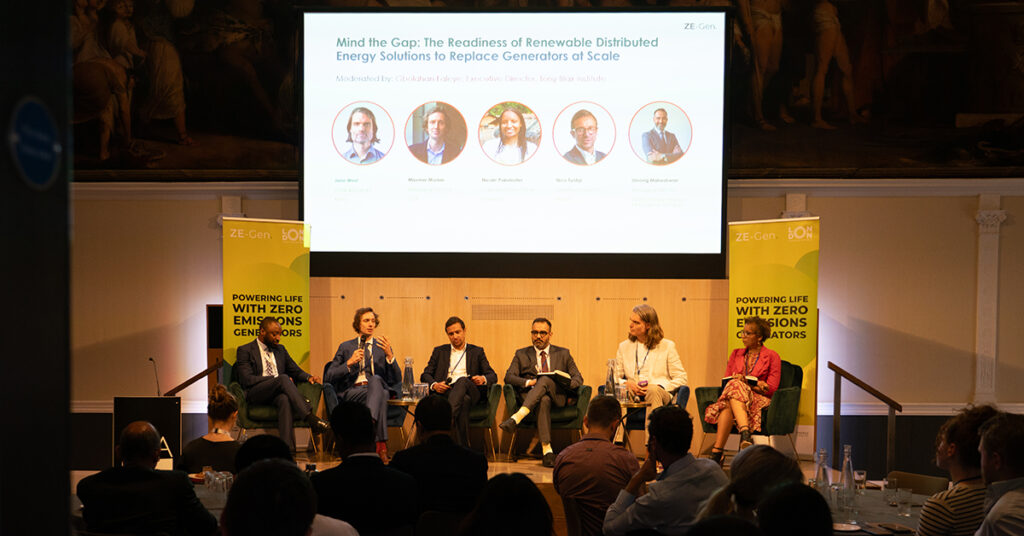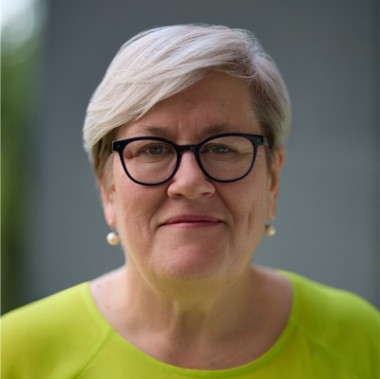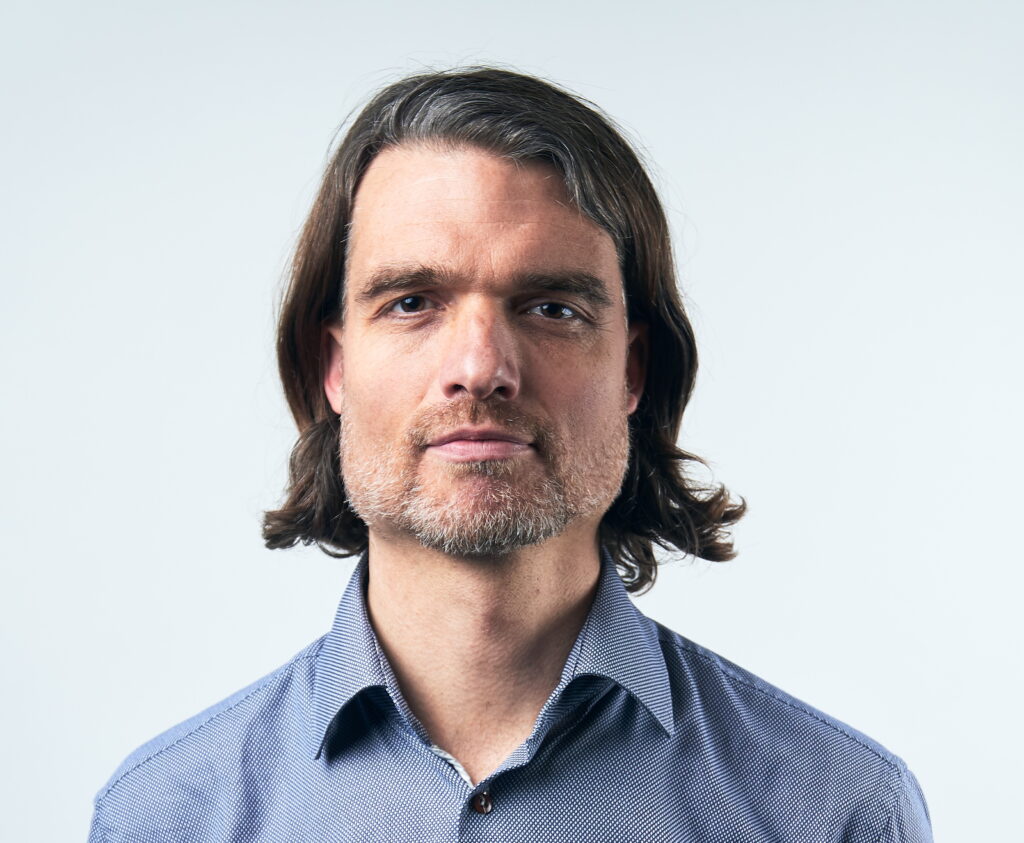The flagship ZE-Gen event at London Climate Action Week 2025, ‘Powering Productivity, Accelerating Investment’, brought together leading changemakers from the worlds of innovation, investment, and policy to explore the huge economic and social opportunities presented through displacing fossil fuel generators with renewable energy solutions. Distributed renewable energy is reshaping unreliable grid settings and the event spotlighted the dual imperative of scaling clean energy solutions while unlocking the economic potential of green investment. From breakthrough technologies to policy frameworks and financing models, the conversation underscored the urgency – and opportunity – of aligning productivity with planetary goals. This summary distils the key insights, challenges, and forward-looking strategies shared during the event.

Key calls to action:
- Partnerships power progress. Cross-sector collaboration uniting public, private, and philanthropic actors is required to mobilise investment, ensure value for money, reduce duplication of efforts, share learnings, and leverage diverse expertise to realise a generator-free future.
- The sector needs backing through supportive policy. Clear, long-term, and people-focused government policies must strengthen the sector ecosystem by supporting local innovators and entrepreneurs and championing best practice regulations and standards to develop context-appropriate and cost-effective solutions.
- Innovative, flexible financing remains key to unlocking investment and scale renewable alternatives. Unlocking investment for distributed renewable energy in emerging markets requires foundational use of blended finance, faster deployment of capital, and increased amounts of equity. Strategic deployment of public, private and philanthropic funds should de-risk investments, helping to make financing on both the supply and demand side, more affordable.
- This challenge is not niche – this is crucial infrastructure. Replacing diesel isn’t a development sideshow – it’s the foundation for economic growth, job creation, and resilience in the Global South. It’s about economic dignity, climate stability, and development equity.
- Localisation doesn’t just matter, it’s fundamental to a timely, effective and just transition. Locally led solutions tailored to specific contexts must be supported through creative financing, enabling policies, and targeted investment in local industries and skilled workforces across the renewable energy value chain to help high-impact innovations reach scale.
- Data-driven decision-making is essential. High-quality, accessible and actionable data (including local knowledge) must be turned into insights and shared across sector stakeholders to enable informed policies, targeted strategies and effective financing that align supply with demand and accelerate the transition.
- Modern distributed renewables need to become trusted like old-fashioned diesel. Diesel generators are out-dated technology but currently win by default because they are familiar, predictable, and standardised. Renewables need to earn that same trust – through performance, reliability, and structure, not only beat it on cost or emissions.
Highlights from ZE-Gen’s ‘Powering Productivity, Accelerating Investment’ event

Rachel Kyte, FCDO Special Representative for Climate: “It’s individual households, businesses, and communities that get connected and through that connection, become more prosperous. But it takes leadership, both national and local, to say: let’s make a bet on our people and their aspirations. If we fail to act — if we don’t improve life for those still relying on polluting generators — we risk losing the bigger argument: that we can come together as a global community to tackle climate change and build shared prosperity.”

Jono West, MoPo: “ZE-Gen has enabled companies like ours to trial innovative technologies and business models in real-world conditions and actually prove their economic value and profitability. It also helps us raise the capital needed to scale. Without ZE-Gen, building a battery business from scratch would be incredibly difficult.”
Panel one
Mind the Gap: The readiness of renewable distributed energy solutions to replace generators and for investment and scale
| Moderator | Gbolahan Faleye | Executive Director @ Tony Blair Institute | Non-Executive Director @ Carbon Trust |
| Panellists | Jono West | Chairman and Founder @ Mobile Power (MoPo) Maxime Marion | Managing Director @ GGF Nico Tyabji | Investment Director @ Mirova Nicole Poindexter | CEO @ Energicity Umang Maheshwari | Managing Director, BESS Consortium @ Global Energy Alliance for People and Planet (GEAPP) |
Framing of Discussion:
The panel discussion explored ways of unlocking investment for distributed renewable energy alternatives to Fossil Fuel Generators (FFGs) in emerging markets, including addressing capital flow challenges, de-risking strategies, and the need for stronger public-private-philanthropic partnerships to scale solutions.
Key Panel Takeaways:
- Capital is not the problem – investable pipelines are.Billions are earmarked for climate and clean energy, but projects remain too fragmented, too small, or perceived too risky to absorb it. The gap is in de-risked, scalable, bankable opportunities – not intent.
- The risk narrative is broken. Perceived risk, especially in weak-grid or off-grid contexts, is often exaggerated. We need to shift investor mindset from avoidance to engagement, backed by data and performance. Perceived risk is often social – a function of unfamiliarity, not fundamentals. The system must learn to trust new players.
- Equity, not debt, is the true bottleneck. There’s more debt than ever for this space – but early-stage equity, especially corporate-level risk capital, remains scarce. Without it, innovation and growth stall.
- Speed matters. Early-stage success stories (like MoPo and Energicity) happened because investors moved fast – weeks, not years. Financial institutions need to rethink diligence speed and flexibility.
- Blended finance is no longer optional – it’s the foundation. Every success story on the panel relied on blended finance. Public, philanthropic and private capital must work together from the start, not in silos or sequence.
- Don’t subsidise failure. De-risk success. Strategic use of guarantees, results-based finance, and smart subsidies should be focused on amplifying what works, not endlessly piloting.
- Aggregated procurement can crash costs. Small developers placing tiny hardware orders drive up costs. Shared procurement platforms are smart levers to reduce costs, increase reliability, and accelerate adoption.
- Results-based financing unlocks overlooked innovators. GGF’s inventory model shows that with modular, fast-tracked financing, even small, unknown, locally-led firms can thrive and scale. Trust + tranches = transformation.
- Speed matters. Early-stage success stories (like MoPo and Energicity) happened because investors moved fast – weeks, not years. DFIs and institutions need to rethink diligence speed and flexibility.
- PPP must become P³: public-private-philanthropic partnerships. Neither governments nor the private sector can do this alone. A new P³ compact is essential for building trust, scale, and long-term viability.
- Collaboration is happening. Cross-sector coordination is gaining traction, and new alliances (like M300) are building shared infrastructure for systemic change.
Panel two
Replacing diesel: Unlocking renewable power for African telecom infrastructure
| Moderator | Jonathan Booth | Senior Manager @ Carbon Trust |
| Panellists | Joslin Lydall | Division Manager @ Catalyst Solutions George Kibala Bauer | Senior Director @ GSMA Mark Thompson | CEO @ AceOn Ravi Suchak | Group Head of External Affairs, Sustainability and Public Policy @ Helios Towers Roochi Solanki | Energy Engagement Manager @ Vodafone |
Framing of Discussion:
This panel examined the barriers and opportunities in transitioning Africa’s telecom and data centre sectors, both major consumers of diesel, to renewable energy, highlighting the role of innovative technologies, financing models, and partnerships, as well as the potential to improve rural energy access.
Key Panel Takeaways:
- Transitioning away from a reliance on diesel is urgent but complex. Telcos across Africa consume over 2.5 billion litres annually.
- There is no one-size fits all solution. Sector transition requires a mix of technologies (solar, batteries, hydrogen and microgrids) and site-specific configurations.
- Innovative funding models are needed to overcome the barrier of high upfront costs. Concessional, carbon and results-based financing mechanisms, as well as ESCO models, must be leveraged.
- Telcos can serve as anchors to mini-grids, supporting rural electrification in underserved communities
- Greater collaboration between energy and digital sectors is required, as well as the removal of operational and regulatory barriers.
Panel three
Powering health through innovation: Mobilising capital for clean energy solutions
| Moderator | Harriet Bradshaw-Smith | Manager @ Carbon Trust |
| Panellists | Marilena Lazopoulou | Energy Access Specialist @ SEforALL Matthew Stone | Engineering Project Manager @ Inclusive Energy Norah Magero | CEO @ Drop Acess) Salvatore Vinci | Technical Lead, Healthcare Facilities Electrification @ World Health Organisation (WHO) |
Framing of Discussion:
The panel emphasised that driving a clean energy transition across the healthcare sector is a life-saving necessity, and called for urgent, coordinated action to scale sustainable electrification, backed by local manufacturing, long-term financing, and government leadership.
Key Panel Takeaways:
- Providing quality access to energy in healthcare is a moral imperative, a human right. We have a collective responsibility to prioritise this sector in the transition away from FFGs.
- Operation and maintenance (O&M) are the Achilles’ heel of healthcare electrification. Less than 10% of projects cover full lifecycle O&M, despite only a 5% increase in CAPEX being needed to ensure adequate provision.
- Local entrepreneurs can deliver pathways to resilience. Local manufacturing and grassroots innovation – like Drop Access’ IoT enabled vaccine fridges – builds resilience, creates jobs and accelerates adoption.
- Government engagement from the outset is crucial to project success – as seen in Sierra Leone, where early involvement of the Minister of Health helped drive the HFE project’s impact.
- Donor-led models dominate (over 90% of initiatives), but long-term sustainability requires government ownership, inter-ministerial and cross-sector coordination, and integration of energy access into national health strategies.
Panel four
Data-driven delivery: Learnings linking generator replacement technologies, finance, and customers
| Moderator | Masaō Ashtine | Senior Manager @ Carbon Trust |
| Panellists | Chukwuemeka Godwin Nwangelem | Director @ Greenage Technologies Mark Gibson | Operational lead @ Global Platform for Action (GPA) Nishant Shankar Narayan | Programme manager @ SEforALL Sarah George | Global Communications and Media Manager @ World Resources Institute (WRI) Polsky Center for the Global Energy Transition Stuart Cannon | Climate Change Group Manager @ The Private Infrastructure Development Group |
Framing of Discussion:
The panel highlighted how high-quality, accessible data is essential to accelerate a transition away from generators, unlock finance and deliver energy access to those most in need, yet major gaps in data quality and coordination and use present barriers to progress.
Key Panel Takeaways:
- Data must be fit-for-purpose. Inaccurate, high-level, underreported or unvalidated data can mislead policy and implementation.
- Good data enables better finance. High quality, credible data helps de-risk investments, validate impact, and unlock capital for local distributors and underserved communities.
- Open and accessible data platforms are essential. Tools like Energy Access Explorer democratise data, support planning, reduce duplication of efforts and burden of data gathering, and bridge silos between sectors and institutions.
- Focus on actionable data, rather than seeking-out perfection. Focus on turning insights into delivery through collaboration across governments, donors, and innovators.
- Data gaps are largest where clean energy is most needed: in rural, humanitarian, informal and other resource-constrained, marginalised contexts.
Panel five
People-centred climate action: A celebration of Global South solutions
| Moderator | Anca Gurzu | Chief European Correspondent @ Cipher News |
| Panellists | Bishal Thapa | Chief Strategy Officer @ CLASP Dana Crawhall | Senior Analyst @ UNEP Climate and Clean Air Coalition (CCAC) Karana Olivier | Founder @ KOC Bridge for Peace Kevin Johnstone | Senior Researcher @ International Institute for Environment and Development (IIED) Santosh Singh | Partner and Managing Director @ Intellecap |
Framing of Discussion:
This panel showcased how community-led innovation, people-focused policy, effective partnerships, and context-sensitive financing are crucial to delivering equitable, scalable climate solutions in the Global South, particularly given recent changes to global funding availability.
Key takeaways:
- Local communities are not passive recipients, but innovators. Local actors are solving problems with creativity and resilience, such as in Côte d’Ivoire where communities are building wind turbines out of scrap materials.
- People-first policy empowers local innovation and collaboration scales it. Governments must create the enabling environment for local solutions to thrive, such as tax removal on renewable technologies. Partnerships are then key. Developing effective partnerships is then key to amplify success stories and scale impact.
- Finance must fit the context. Climate finance must be reimagined and carefully tailored to support local, small-scale, inclusive, and high-impact solutions.
- Donors must embrace broader, more flexible metrics alongside numerical reporting. More value needs to be placed on lived experiences and community voices to capture true impact.